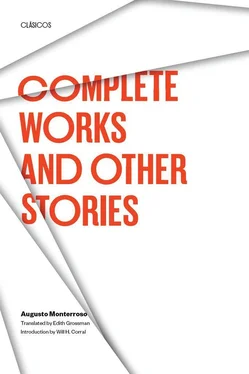Notes
1 Benny Albert of The New York Times ( Endymion, May — June 1964).
2 Don Mulligan of the Associated Press, ibid.
4 Kan, Precious Jewel, will be the day on which Katún 5 Ahau declines. It will be the time when skulls pile up and flies weep along the streets of the town and at the resting places along the streets of the town.
THE BOOK OF BOOKS OF CHILAM BALAM
Humor and timidity generally go together. You are no exception. Humor is one mask and timidity is another. Do not allow anyone to remove both at the same time.
THE ADVANTAGES AND DISADVANTAGES OF JORGE LUIS BORGES
What kept the foolish flies from savoring your lunch of distinguished fowl was its superb tail.
MARTIAL, EPIGRAMS
When I discovered Borges in 1945, I did not understand him; in fact, I was stunned. Looking for Kafka, I found Borges’ prologue to Metamorphosis and confronted for the first time his world of metaphysical labyrinths, of infinities, eternities, tragic trivialities, and domestic relations comparable to the most carefully imagined inferno. A new universe, brilliant and fiercely attractive. The passage from that prologue to everything Borges has written was, for me and for so many others, something as necessary as breathing, and as dangerous as coming perilously close to the edge of an abyss. Following him meant discovering and descending to new circles: Chesterton, Melville, Bloy, Swedenborg, Joyce, Faulkner, Woolf; it meant renewing old relationships: Cervantes, Quevedo, Hernández; finally, it meant returning to that illusory paradise of the ordinary: neighborhoods, films, detective novels.
And then there was his language. Today we accept it with a certain naturalness, but in those days his Spanish, so tight, so concise, so eloquent, had the same effect on me as thinking that someone was dead and buried and then, without warning, seeing him alive and well on the street. Through some mysterious art this language of ours, so dead and buried for my generation, suddenly acquired a strength and power we thought it had lost forever. Now, it seemed, Spanish could once again express anything with clarity and precision and beauty; one of our own could tell again, and interest us again, in an aporia of Zeno, and one of our own (I don’t know if this is another again) could raise a detective story to the level of art. We were subjects of resigned colonies, skeptical regarding the usefulness of a language that had been squeezed dry; we owe the restoration of faith in the possibilities of our inescapable Spanish to Borges and his excursions through English and German.
Since we are accustomed to a certain kind of literature, to specific ways of handling a story or resolving a poem, it is not strange that Borges’ methods take us by surprise, and from the very first we either accept or reject him. His principal literary device is precisely this surprise. Beginning with the first word in any of his stories, everything can happen. But a reading of all the stories together demonstrates that the only thing that could happen is whatever Borges, possessed of implacable logical rigor, had proposed from the start. For example, the mystery story in which the detective (a victim of his own intelligence, his own subtle plotting) is pitilessly trapped and killed by the scornful criminal; or the melancholy revision of the presumptive work by the Gnostic Nils Runeberg, in which it is concluded, with tranquil certainty, that God, in order to truly be Man, did not incarnate in a superior human being like Christ, or Alexander, or Pythagoras, but in the baser, and therefore more human, vessel of Judas.
When a book begins, as Kafka’s Metamorphosis does, by proposing: “Gregory Samsa awoke one morning after a restless sleep to find himself in his bed, transformed into a monstrous insect,” the reader, any reader, has no other recourse but to decide as quickly as possible on one of two equally intelligent responses: either throw away the book or read to the end without stopping. Knowing that countless bored readers would decide on the comfortable first solution, Borges does not overwhelm us by telegraphing his first punch. He is more elegant, or more cautious. Like Swift, who begins Gulliver’s Travels by innocently telling us that the protagonist is merely the third son of a harmless small landowner, Borges introduces us to the marvels of Tlön by going to a villa in Ramos Mejía in the company of a friend, who is so real that at the sight of an unsettling mirror he happens to “remember” something like this: “Mirrors and copulation are abominable because they increase the number of men.” We know that this friend, Adolfo Bioy Casares, exists; that he is a man of flesh and blood who writes fantasies; but if this were not so, merely attributing this sentence to him would justify his existence. The horrifying, realistic allegories of Kafka begin with an absurd or impossible event and then immediately relate all the effects and consequences of this event with calm logic and a realism that is difficult to accept without the reader’s prior good faith or credulity; yet one always has the conviction that this is pure symbol, something necessarily imagined. But when one reads Borges’ Tlön, Uqbar, Orbis Tertius, the most natural response is simply to consider it a rather tedious scientific essay that is attempting to demonstrate, not very emphatically, the existence of an unknown planet. Many people will go on believing this until the day they die. Some may have their suspicions and will ingenuously repeat the words of that bishop, described by Rex Warner, who boldly declared that as far as he was concerned the events narrated in Gulliver’s Travels were nothing but a pack of lies. A friend of mine was so disoriented by the collection The Garden of Forking Paths that he confessed that what attracted him most about the story “The Library of Babel” was the stroke of genius revealed by using an epigraph from The Anatomy of Melancholy , a book, according to him, that was clearly apocryphal. I showed him the volume by Burton and thought I had proved to him that all the rest was invented, but from that moment on he opted to believe everything or absolutely nothing, I can’t remember which. Factors that contribute to the effect of authenticity in Borges are the inclusion in the story of real people like Alfonso Reyes, presumably real people like George Berkeley, well-known, familiar places, works that may not be readily available but whose existence is in no way improbable, like the Encyclopaedia Britannica, to which one can attribute anything; the serene, journalistic style, in the manner of Defoe; the consistent solidity in his use of adjectives, because for countless readers nothing is more convincing than the precise placement of a good adjective.
And, finally, the great problem: The temptation to imitate him was almost irresistible, but imitating him was pointless. Anyone can, with impunity, imitate Conrad, Greene, Durrell, but not Joyce, not Borges. It is too easy, and too obvious.
The encounter with Borges never occurs without consequences, both advantageous and disadvantageous. I have listed some of the things that can happen.
1. You pass him and don’t realize it (disadvantageous).
2. You pass him, go back, and follow him for a while to see what he is doing (advantageous).
3. You pass him, go back, and follow him forever (disadvantageous).
4. You discover that you are a fool and have never had an idea that was even moderately worthwhile (advantageous).
5. You discover that you are intelligent, for you like Borges (advantageous).
Читать дальше











